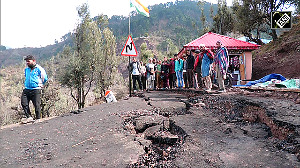There is deep concern among leading South Asia watchers in Washington over the volatile situation in Kashmir and the renewed cry for independence by the separatists which they fear could revert to the Intifada-like agitation of the 1990s.
In interviews with rediff.com, these experts also acknowledged that the situation may also provide elements in Pakistan, especially the ISI, more so in the wake of the upheaval brought on by President Pervez Musharraf's resignation and the dysfunctional government in Islamabad, an opportunity to foment yet another insurgency in the Valley and ramp up a proxy war reminiscent of old against India.
Former diplomat Howard B Schaffer, who served for 36 years in the US Foreign Service, of which a total of eight were spent in New Delhi during which time he was the US government's principal expert on Kashmir, said, "I am very much discouraged by this situation in Kashmir. It really reflects the ultimate inability of the Indian government to reconcile the people of Kashmir to their connection with India."
Schaffer, who while at the State Department, served two terms as the Deputy Assistant Secretary of State for South Asian Affairs, at the time the senior-most position in the Administration dealing with the subcontinent, said, "It was very badly handled," by the government of India, and while acknowledging that like the uprising in 1989-1990 "it was home generated," warned that "as happened then, the Pakistanis are very likely to fish in troubled waters, even though God knows, they've got enough problems on their hands."
Currently, the Director of Studies at the Institute for the Study of Diplomacy, which is part of Georgetown University's School of Foreign Service, he said it was indeed ironic that the Indian National Security Adviser M K Narayanan was on Thursday lamenting the exit of Musharraf and talking about a 'political demise,' in Pakistan following his departure.
Schaffer, who is completing one of the most comprehensive books on US foreign policy vis-à-vis Kashmir, titled America's Role in Kashmir: The Limits of Influence, said, "For sure, Musharraf was devoted to this peace process -- he got it started in 2004 -- but before that, you remember, he was very much in the bad books of the Indian government and the Indian public."
"He was the Kargil man, his government was behind the attack on (the Indian) Parliament and so on and so forth, so that we got to remember that there was a considerable reversal (from the earlier moves at rapprochement with New Delhi initiated by Prime Minister Nawaz Sharif whom Musharraf deposed). But, not only did he get the peace process restarted, but he also made proposals that were unprecedented for Pakistan, such as finding a solution outside the framework of the UN resolutions."
Schaffer said if was also Musharraf, who accepted 'the Line of Control as a permanent boundary and these things will now not continue because whatever government is in power in Islamabad -- whether it is dominated by the Pakistan People's Party or whether Nawaz (Sharif) comes in -- they won't be able to make concessions of this sort that Musharraf was able to make when he was strongly, firmly in power."
"And, so there will be a temptation as there already has been to play for the audience and that can only continue to have a bad reaction in India," he said, and added, "But you never thought did you that India would be longing for the good old days with General Musharraf."
Schaffer acknowledged that it has always been the case for Pakistani civilian government's when it is beset by domestic problems to rake up the Kashmir issue and even though the current situation in Jammu and Kashmir began with a domestic conflagration over land allocation for Amarnath pilgrims, Pakistan was trying to get mileage out of it and internationalize it, even as it could give ideas to rogue elements in the ISI and the Army to exacerbate the agitation of the separatists and militants.
He hoped that Pakistan's Army Chief, 'General (Ashfaq) Kiyani will be sensible enough to recognize the stakes involved and to understand where Pakistan's priorities now rest. As I said before, the last thing it should want to do is to get itself into a tiff with India.'
Schaffer acknowledged, "I don't see that as a way of, even in the middle term, developing its popularity, but it may feel so and I think if it does, it will be a major mistake."
The other half of this Washington 'power couple,' when it comes to foreign policy on South Asia, his wife, Teresita Schaffer, who also served in South Asia and has nearly three decades of experience as a diplomat, and succeeded her husband as Deputy Assistant Secretary of State for South Asia, echoed similar sentiments.
Teresita said she believed the current government in Islamabad "wants to keep things on an even keel and eventually to pursue the peace dialogue. But the disturbances in Kashmir will put pressure on that whole situation -- and will tempt those who don't want peace to meddle. So, I am worried."
"It is certainly an opportunity for trouble," she added, and noted, "There are both similarities and differences with the 1990s. One interesting difference is the role of the Amarnath land issue and of the Jammu Hindu community."
Schaffer, now the head of the South Asia program at the Centre for Strategic and International Studies, said, "The Amarnath land grant got a lot of people stirred up, but when the new governor, N N Vohra, resolved that, it was people from Jammu who expanded the protest. So, far more than the previous episodes, this one has local roots."
Sumit Ganguly, professor of political science and Director of the India Studies Program at Indiana University in Bloomington, however, did not believe it could become another Intifada like in the 1990s, "especially if the Indian State, however, belatedly, manages to demonstrate a degree of dexterity in defusing the crisis."
"It has already shown, after one or two initial missteps, that it is capable of showing restraint even in the face of grave provocation," he said. "It needs to keep doing more of the same despite pressures from within elements of the national security establishment to adopt a harder line."
Ganguly argued that "it also needs to douse the flames in Jammu as they tend to generate their own fires in the Valley."
But, he warned that "the wild card in all of this, remains both the Islamists and the Hindu zealots, who thrive on each other follies and short-sighted goals and actions."
Former Assistant Secretary of State for South Asian Affairs Karl F Inderfurth, now a professor of international relations at George Washington University and foreign policy adviser to the Obama presidential campaign, said, "There have been a lot of reasons that go back several weeks as to how this thing flared up."
But, he too agreed that "there are those who do want to reverse the (peace) process," between India and Pakistan, "and with the distracted political leadership in Pakistan, I believe that some of these forces are beginning to assert themselves again."
Robert Hathaway, director of the Asia Program at the Woodrow Wilson International Center for Scholars and a former Congressional staffer on South Asia on the Foreign Affairs Committee, also expressed concern and said, "It is something for the US and the international community to watch," and make clear to Pakistan it would not tolerate any meddling by the ISI or elements within the Army.
"I am very concerned and clearly it has the potential to unravel and the situation is far more worrisome than it was earlier, because American intelligence has conclusive evidence that elements associated with the ISI were involved in planning and perhaps even carrying out the bombing of the Indian embassy in Kabul," he said.
Hathaway acknowledged that "the current upsurge in violence and in agitation is the result of conditions within both Jammu and the Valley itself and the increased violence and the increased tension in the Valley was largely the result of developments within the Valley. So, I could believe that I am not going to point the finger at Pakistan because of that."
"But neither can we rule out that they are not involved because we all know that Pakistan has a long history of fishing in troubled waters in Kashmir. It has a long history of supporting insurgent groups of various sorts," he added.






 © 2025
© 2025